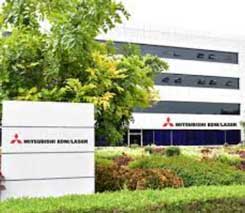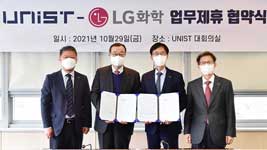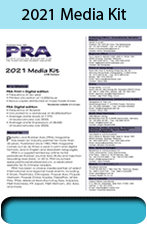Green tie-ups: Mitsubishi Chemical licenses biomass-based polyester to Mitsui Chemicals; LG Chem-UNIST tie-up on ESG-based technology

Mitsubishi Chemical Corporation (MCC) says it has recently signed a licensing agreement with Mitsui Chemicals for the related patent including MCC-owned basic patent (JP4380654) on a biomass-based polyester.
The products covered by this license include polyethylene terephthalate (PET), which use renewable biomass resources, and are expected to have a variety of industrial applications such as the manufacture of bottles. In contrast to conventional, petroleum-derived products, this biomass-based polyester can be expected to facilitate the reduction of greenhouse gas emissions.
The patent owned by MCC is a substance patent for a biomass-based, high-quality polyester and is the basic patent required for business operations engaged in the manufacture or sale of this material. MCC has already registered the patent not only in Japan but also in the US, EU, and China.
MCC owns many other patents for biomass-based products. To foster the adoption of biomass-derived materials that impose lower environmental loads, MCC will not only continue to expand its own business but also promote collaborative efforts and licensing arrangements with other companies, thereby contributing to the creation of a sustainable carbon society.

Meanwhile in other news, Ulsan National Institute of Science and Technology (UNIST) and South Korean chemical firm LG Chem will jointly conduct R&D of future proprietary technologies in the fields related to sustainability such as carbon neutrality and biomass, as well as battery materials and artificial intelligence (AI).
UNIST is a science and technology specialised university with research focus on high-tech new materials, bio, and next-generation energy, etc.
The university also operates the Artificial Intelligence Graduate School, a project supported by the Ministry of Science and ICT, and the largest secondary battery research centre among universities in the world.
In addition, with strengths in future fields which will realise carbon neutrality, such as hydrogen, solar battery and carbon capture and utilization (CCU), the University plans to open the Carbon Neutrality Convergence Centre in 2022 and lead the education and research related to carbon neutrality.
LG Chem will invest 10 trillion Korean Won until 2025 to foster new-growth engines such as eco-friendly materials, battery materials and bio; therefore, synergy between the two organisations is expected in the demonstration and commercialization of related technologies.
Through this agreement, the two organisations will engage in joint research in areas such as catalyst technology required to convert CO₂ into hydrocarbons, etc; production of bioplastics using microorganisms; development of cathode active material to increase battery capacity, and establishment of autonomous driving laboratory for automation of processing and analysis and optimisation of experimental design.
CTO Jiyung Yu stated "LG Chem will work closely with UNIST to preoccupy outstanding talent through the Carbon Neutral Convergence Centre scheduled to open in 2022, which has strengths in research fields related to next-generation energy and advanced new materials to secure ESG-based proprietary technology as a new growth engine of the company.”
(PRA)
Subscribe to Get the Latest Updates from PRA Please click here
©2021 Plastics and Rubber Asia. All rights reserved.

©2020 Plastics and Rubber Asia. All rights reserved.
Home Terms & Conditions Privacy Policy Webmail Site Map About Us

















